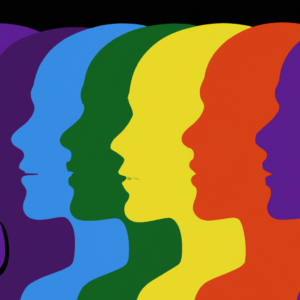In today’s diverse and inclusive society, it is essential to create a safe and supportive environment for all individuals, including LGBTQ youth. Many young people face unique challenges and struggles as they navigate their sexual orientation, gender identity, and the process of self-discovery. To address these issues, LGBTQ youth counseling plays a vital role in providing the necessary support, guidance, and empowerment for LGBTQ youth to thrive and live authentically. In this blog, we will explore the importance of LGBTQ youth counseling, its benefits, and the various ways it can positively impact the lives of LGBTQ young people.
Contents
Challenges Faced by LGBTQ Youth

These are some challenges faced by LGBTQ youth counseling:
- Social Stigma and Discrimination: LGBTQ youth frequently experience social stigma, prejudice, and discrimination due to their sexual orientation or gender identity. This can manifest in various ways, including bullying, harassment, verbal abuse, or exclusion from social circles. Such negative experiences can lead to feelings of isolation, low self-esteem, and mental health issues.
- Family Rejection: Coming out to family members can be a difficult and emotional process for LGBTQ youth. Unfortunately, not all families are accepting or understanding. Many LGBTQ youth face family rejection, which can result in strained relationships, homelessness, or reliance on alternative support systems. Family rejection can have a profound impact on their mental health, leaving them feeling abandoned and unsupported.
- Mental Health Challenges: LGBTQ youth are more likely to experience mental health challenges compared to their heterosexual and cisgender peers. The constant fear of rejection, discrimination, or violence takes a toll on their emotional well-being. Depression, anxiety, self-harm, and suicidal ideation are significantly higher among LGBTQ youth. The lack of appropriate support and understanding exacerbates these issues, making it crucial to prioritize mental health resources and counseling services.
- Lack of Supportive Spaces: Finding safe and supportive spaces can be challenging for LGBTQ youth, particularly in conservative or less accepting communities. Schools, religious institutions, and community centers may not always provide an inclusive and affirming environment. The absence of these spaces can contribute to feelings of alienation and hinder the process of self-acceptance and identity exploration.
Benefits of LGBTQ Youth Counseling
Here are some of the benefits of LGBTQ youth counseling:
- Emotional Support: LGBTQ youth counseling offers a safe and non-judgmental space where young people can express their thoughts, feelings, and concerns. It provides them with emotional support, validation, and understanding, which can be particularly important for individuals who may face discrimination or rejection due to their sexual orientation or gender identity.
- Identity Exploration: Counseling can help LGBTQ youth explore their sexual orientation and gender identity in a supportive environment. They can discuss their feelings, concerns, and questions related to their identity, which can lead to increased self-awareness, self-acceptance, and a better understanding of who they are.
- Coping Strategies: LGBTQ youth often face unique challenges, such as coming out to family and friends, dealing with prejudice or bullying, or navigating relationships. Counseling can equip them with coping strategies and tools to manage these challenges effectively. They can learn healthy ways to cope with stress, develop resilience, and build a strong support network.
- Mental Health and Well-being: LGBTQ individuals, including young people, may be at a higher risk of experiencing mental health issues such as depression, anxiety, or suicidal ideation due to societal pressures and discrimination. LGBTQ youth counseling provides a space to address these concerns, manage mental health symptoms, and develop strategies for self-care and emotional well-being.
- Self-Acceptance and Self-Esteem: LGBTQ youth counseling promotes self-acceptance and helps individuals embrace their sexual orientation or gender identity. Through counseling, they can develop a positive self-image, build self-esteem, and learn to celebrate their authentic selves. This can lead to improved overall mental health and a greater sense of well-being.
Finding LGBTQ Youth Counseling Near You
Finding LGBTQ youth counseling near you can be done through various channels. Here are some methods you can use to locate LGBTQ youth counseling services:
- Online Search: Conduct an online search using keywords like “LGBTQ youth counseling,” “LGBTQ counseling services,” or “LGBTQ mental health support” in combination with your location. This can help you find local counseling centers, community organizations, or therapists specializing in LGBTQ youth.
- LGBTQ Community Centers: Many cities have LGBTQ community centers or organizations that offer counseling services or can provide referrals to LGBTQ-friendly counselors. Search for community centers or LGBTQ organizations in your area and inquire about counseling resources they may offer.
- Mental Health Directories: Explore mental health directories or online platforms that allow you to search for therapists based on specific criteria, including LGBTQ-friendly therapists or those specializing in working with LGBTQ youth.
- LGBTQ Support Hotlines: LGBTQ support hotlines or helplines can provide guidance and information about local counseling resources for LGBTQ youth. They may also offer crisis intervention services. Examples of helplines include The Trevor Project (for LGBTQ youth) and the GLBT National Help Center.
What to Expect in LGBTQ Youth Counseling
LGBTQ youth counseling offers a supportive and affirming environment designed to meet the unique needs of young individuals. Here’s what you can expect:
- Safe and Inclusive Environment: LGBTQ youth counseling provides a safe space where individuals can express themselves freely, without fear of judgment or discrimination. Counselors create an environment that values diversity and promotes acceptance.
- Confidentiality and Trust: Counselors prioritize confidentiality, ensuring that personal information shared during sessions remains private. This commitment to trust allows LGBTQ youth to open up about their experiences, concerns, and goals without hesitation.
- Tailored Approach and Techniques: LGBTQ youth counseling employs various therapeutic approaches tailored to individual needs. These may include cognitive-behavioral therapy (CBT), narrative therapy, or other evidence-based techniques. Counselors adapt their methods to address specific challenges and goals.
How LGBTQ Youth Counseling Works

LGBTQ youth counseling typically follows a similar framework to general counseling practices but with a specific focus on the needs and experiences of LGBTQ youth. Here’s an overview of how LGBTQ youth counseling works:
- Initial Assessment: The counseling process often begins with an initial assessment session. This allows the counselor to gather information about the youth’s background, concerns, and goals for counseling. It is also an opportunity for the youth to ask questions and determine if they feel comfortable working with the counselor.
- Creating a Safe and Supportive Environment: LGBTQ youth counseling aims to provide a safe and affirming space where young individuals can express themselves openly without fear of judgment or discrimination. The counselor establishes trust, confidentiality, and a non-biased attitude, creating an environment that respects the youth’s gender identity and sexual orientation.
- Exploration of Identity and Concerns: This counseling focuses on exploring and understanding the youth’s sexual orientation, gender identity, and any concerns or challenges they may face related to their LGBTQ identity. The counselor may help them navigate the process of self-discovery, self-acceptance, and coming out if desired.
- Coping Strategies and Skills Development: The counselor assists LGBTQ youth in developing coping strategies and skills to manage the unique challenges they may encounter, such as dealing with prejudice, discrimination, or navigating relationships. This can include developing resilience, assertiveness, communication skills, and self-care practices.
- Mental Health Support: LGBTQ youth counseling addresses mental health concerns that the youth may be experiencing, such as depression, anxiety, or stress related to their sexual orientation or gender identity. The counselor provides support, validation, and guidance in managing these issues and may employ therapeutic interventions or techniques tailored to the individual’s needs.
The Role of Counselors in LGBTQ Youth Counseling

Counselors play a vital role in LGBTQ youth counseling by providing support, guidance, and a safe space for young individuals to explore their sexual orientation, gender identity, and related concerns. Here are some key roles that counselors fulfill in LGBTQ youth counseling:
- Creating a Safe and Affirming Environment: Counselors establish a safe and affirming environment where LGBTQ youth can openly discuss their thoughts, feelings, and experiences without fear of judgment or discrimination. They create a non-biased and accepting space that respects the youth’s gender identity and sexual orientation.
- Building Trust and Rapport: Counselors strive to build a trusting and supportive relationship with LGBTQ youth. They actively listen, validate their experiences, and foster a sense of trust and rapport. This helps create a foundation of trust that allows the youth to feel comfortable expressing their concerns and exploring their identity.
- Exploring Sexual Orientation and Gender Identity: Counselors assist LGBTQ youth in exploring their sexual orientation, gender identity, and any related questions or concerns. They help young individuals develop self-awareness, self-acceptance, and a better understanding of their unique identity.
- Addressing Mental Health Concerns: LGBTQ youth may experience mental health challenges such as depression, anxiety, or suicidal ideation due to societal pressures, discrimination, or rejection. Counselors provide support, guidance, and therapeutic interventions to address these concerns and promote mental well-being.
- Providing Coping Strategies and Skills: Counselors equip LGBTQ youth with coping strategies and skills to navigate the challenges they may face. This can include developing resilience, assertiveness, communication skills, and effective ways to cope with stress or discrimination.
- Offering Education and Resources: Counselors provide education and resources on LGBTQ-specific topics such as LGBTQ history, rights, safe sex practices, and community support networks. They ensure that youth have access to accurate information and resources to make informed decisions about their well-being.
Conclusion
LGBTQ youth counseling serves as a crucial lifeline for young individuals navigating their unique journeys. By offering support, acceptance, and empowerment, these counseling services play a vital role in enhancing the mental health and well-being of LGBTQ youth. Through a combination of personalized therapy, group support, and advocacy, counselors help individuals build resilience, develop coping strategies, and embrace their authentic selves.
Life may sometimes be challenging for people from the LGBTQ community, but Online LGBTQ Counseling can help. Get experienced LGBTQ therapists at PrideMantra: Book a trial LGBTQ therapy session.


